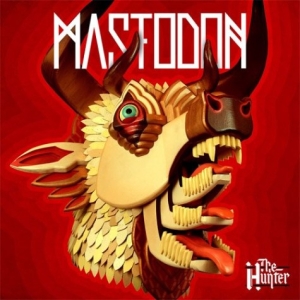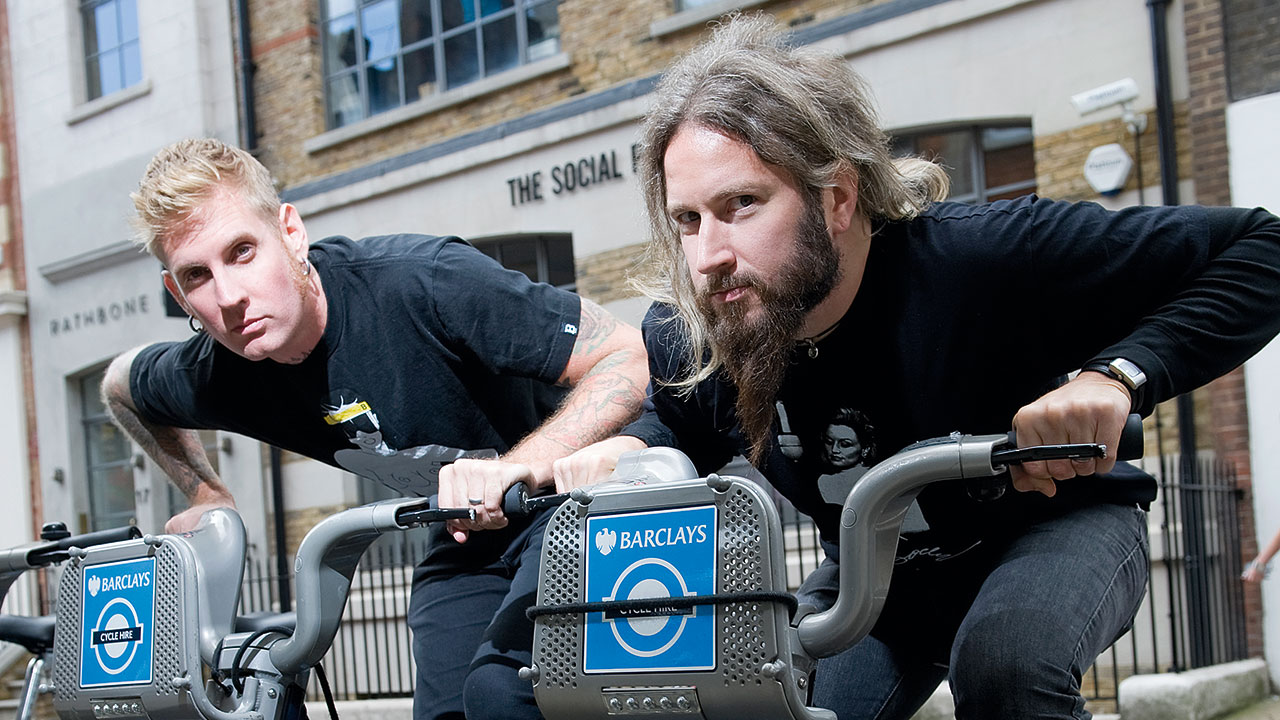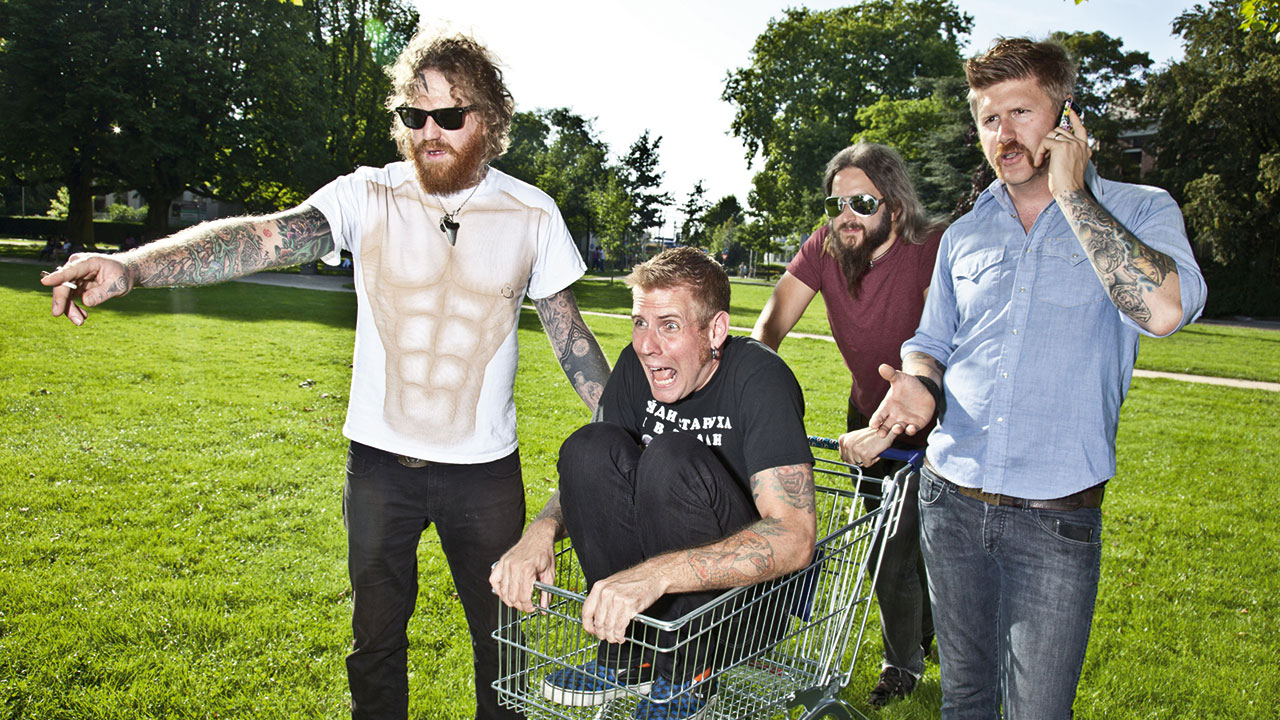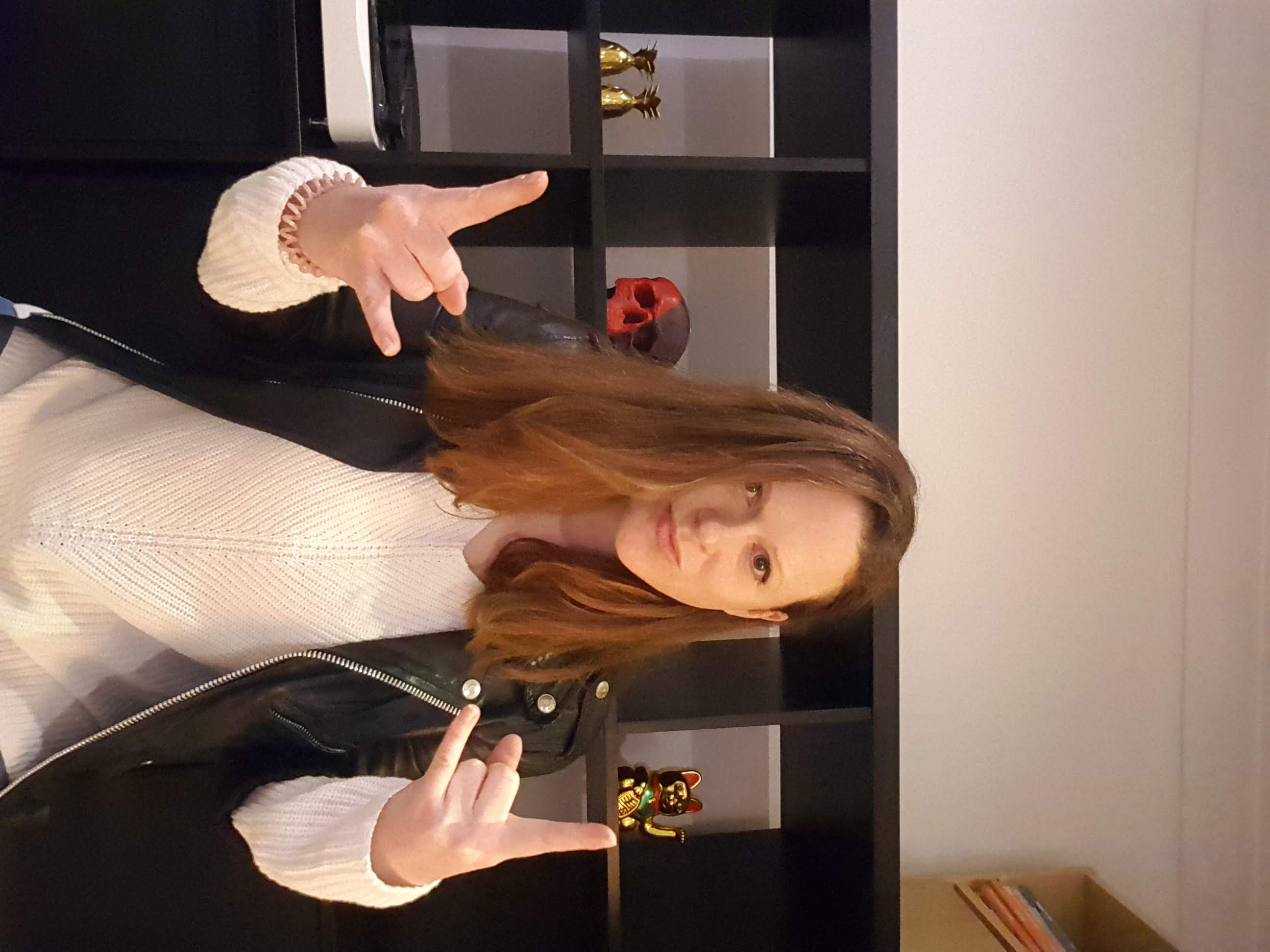Crack The Skye established US prog metallers Mastodon on many prog fan's radars. When it came to a follow-up there were bigger riffs and choruses, but it still beat with a prog heart, as the band told Prog when we sat down to talk about The Hunter in 2011.
Mastodon thrive on change; and unlike its namesake, Atlanta's progressive titans have sidestepped extinction through the clever notion of adaption. In an ‘attention deficit society’ they are also surviving an industry and a market that cries out for new ideas and reinvention, and none more so than with their newest album The Hunter.
“It’s not in our nature to say we’re going to write songs that are different to anything we’ve ever done, because that puts pressure on us. But thankfully it comes naturally. I love change, we embrace the unknown.”
The words of Troy Sanders, Mastodon’s bassist since their inception in 1999, resonate. Not just with his bandmates or your trusty scribe, but with the swathe of fans they have amassed throughout their career. When their last album, Crack The Skye, came out, people sat up and listened. Here was a band, traditionally regarded as metal, releasing a masterpiece in heavy prog which became not only a landmark record for metal fans, but an enthralling concept album for proggers with a penchant for metallic elements.

For their fifth album, Mastodon could quite easily have knocked out Crack The Skye part two and no one would have batted an eyelid. But sticking to their ethos they have surprised us again. The Hunter is the most melodic record this Georgia-rooted four-piece have created to date – to the extent that it contains a plethora of – saints above! – sing-a-long choruses. Gone are the heaps of thick, oppressive, acerbic riffs borne out of their mutual admiration for post-punk and sludge metal. Here instead are groovy basslines, acrobatic drumming, sensitive riffs, vast, spatial, shimmery effects and gentle psychedelic choruses.
“Once we decided to shed the idea of having another concept album, I feel like it breathed fresh energy back into the band, and that’s what lent itself to songs coming together rather quickly,” says Sanders, visibly excited over their burst of creativity. His bandmate Brann Dailor chips in:
“We thought how cool would it be to abandon the Mastodon comfort zone and do something completely different.”
While being very melodic in many points throughout the record, The Hunter is also more urgent and riff-laden than Crack The Skye. There’s a reason for this, Dailor explains.
“It’s a knee-jerk reaction to spending two years touring Crack The Skye, which was so proggy and layered. We kind of just wanted to let loose from that. The songs are probably the most instinctual we’ve ever put together, where we’ve worked the least on fine-tuning and tailoring every little piece.”
Rather than a conscious decision to shy away from an intensely proggy approach, both Sanders and Dailor attribute their more melodic direction to musical ideas that simply came naturally, at one point name-checking the ‘riff gods’ for their inspiration. You can almost picture it – four burly, bearded musicians gathered in a practice room tentatively waiting for their epiphany. Of course, there’s a practical side to this all; knowing that they’d be booked up all summer with festival appearances it was ‘now or never’ to get the songs laid down.
“Our music is like milk,” Dailor says. “If we let it sit while we go to Europe it would have spoiled a little bit.”
Realising the need to capture the moment, Mastodon went into the studio, sharing their time between Los Angeles and Atlanta over six weeks – a remarkably short time in any band’s books, let alone one whose records are crammed with labyrinthine riffs and melodies. Continuing their trend of doing things differently they roped in producer Mike Elizondo, who is better known for his work with hip hop artists such as Eminem. Their choice of cover art saw another departure. Instead of Paul Romano – the guy responsible for the first four Mastodon album covers – this time round they’ve gone with AJ Fosik, the creator of the vibrant yet terrifying mythical beast sculpture that defines The Hunter.
“We don’t know him [Fosik], but I saw his work years ago and always had him in the back of my mind in case we used a different artist,” says Dailor. “And, yeah, Romano was disappointed but I think he understands.”
Sanders summarises the hiring of Fosik in the context of this project as a whole: “Every aspect of the album changed – new producer, new artist. We want the artwork to come from someone who is incredibly passionate and talented and we want people to realise it isn’t just a picture of a mythological creature, this is an epic wood sculpture that took complete dedication.”
While it has been mentioned that the title of the album refers to Hinds’ brother, who died last year while on a hunting trip, Dailor and Sanders stress that this is in no way a concept piece, nor is the lyrical content directly connected to their bandmate’s sibling.
“Ultimately it’s a collection, but each song has a story of its own,” explains Sanders.

Talking to Dailor about some of these stories it becomes apparent that Hinds’ loss is not the only traumatic experience to affect the band. Behind every rock’n’roll lifestyle there are loved ones who get left by the wayside, and while Dailor is not prepared to divulge his own personal life, you can’t help sense there is a family that deeply misses him.
“We are constantly disappointing the people that we care about the most with being gone so often. So a lot of the themes on the record kind of have to deal with the people we’re closest to. Some of it’s almost like an apology to those people.”
Picking up from Dailor’s candid response, Sanders admits: “We touch on loss, we touch on grief, we touch on triumphant moments – it’s all over the place. And then we’ll think about how an octopus feels. We’ll go from very deep, sorrowful subjects to talking about the Swamp Thing’s baby.”
“Or being a baby!” Dailor comes back. “The Thickening is about being in a crib and wanting to be picked up and nursed, and then there’s Stargasm, which isn’t exactly about having sex in space but it’s about having the best sex you’ve ever had with someone you really connect with and you go up into space. And Blasteroid is like a playground song where you’re bouncing off the walls and the lyrics are: ‘if you’re sad and need to cry then turn around and go outside’. It’s like a little kid wrote it.”
It’s a regrettable fact that lyrical content in the world of heavy metal often gets overlooked so it’s satisfying to listen to these two musicians regale the vibrant, surreal and sensitive tales that relate to their music. Although the title Bedazzled Fingernails is a cheeky nod to Hinds’ playful fretwork, the lyrical content is a reference to the fact that his entire family are born under the Chinese sign of the Ox. Dailor explores a further emotional topic in All The Heavy Lifting: “I had a movie playing in my head, of my wife and I in the woods running around and me saving her, and then some of the lyrics are about a bad situation I had back home. I was sitting behind my drums feeling numb and stressed out at not knowing what to do, and I heard in my head: ‘just close your eyes and pretend everything’s fine’.”
This lyrical refrain is one of the catchiest moments on The Hunter and also the first song that Mastodon recorded. Asked whether they can see their fans joining them for the chorus, Sanders seem eager: “That, we hope, is the song that all our friends will be able to sing along with. I’m excited about that!”
In relation to their other albums, The Hunter touches on both old and recent material. There are moments that echo Radiohead’s OK Computer, Pink Floyd’s spatial awareness or the atmospheric grandeur of Muse, while heavier songs hark back to their sludge roots. Had Mastodon stuck with the style exemplified in early albums like Remission they could have ended up playing the type of music we traditionally class as stoner or desert rock, with a weighty Sabbath influence. Yet the band’s love for prog has spurred them on to create something far more complex.
“The old Genesis stuff is probably some of my favourite music ever created,” Dailor says with a smile. “Gabriel-era Genesis, too. But even when he left there were records that still embrace their proggier side.”
Sanders has his own view on the genre: “I remember very well when I was introduced to Pink Floyd – they frightened me! And King Crimson irritate me to this day because they’re so damn good. Recently touring with Mars Volta and Tool, I love that specialness they embrace with this thinking man’s music.”
On top of their genre-defining sound, the iconic artwork and the incendiary live shows, it’s sometimes forgotten that here is a band that have stuck together since their inception more than 10 years ago, overcoming deaths of loved ones (Dailor’s sister committed suicide aged 14), drug abuse and a near-fatal altercation involving Hinds. And that is a vast achievement in itself. Sanders concludes: “I never thought it would last. It’s rare that any relationship can last this long, much less with three grown men that I’m ‘married’ to.”

